The Smoothstack lawsuit is one of the latest legal battles against exploitative contracts, misleading employment practices, and unlawful wage schemes in the tech sector. Given that over one-third of U.S. economic growth comes from the tech sector, addressing these labor rights issues is crucial, as their effects on the tech workforce can compromise the talent pipeline and, thus, the tech industry’s long-term sustainability.
At Sparrow, we specialize in class action discovery and the settlement claims filing process. Whether it’s a labor-related case like unpaid wage settlements and the Smoothstack lawsuit or a retail-related one like the WinCo class action, our tools and expertise can help you find and file a claim for any eligible class action.
With this experience on board, we’ve put together this blog to explore the background and specific claims surrounding the Smoothstack lawsuit. We’ll also discuss the legal precedent behind this case and its implications for the future.
Let’s get started.
Overview of the Smoothstack Lawsuit
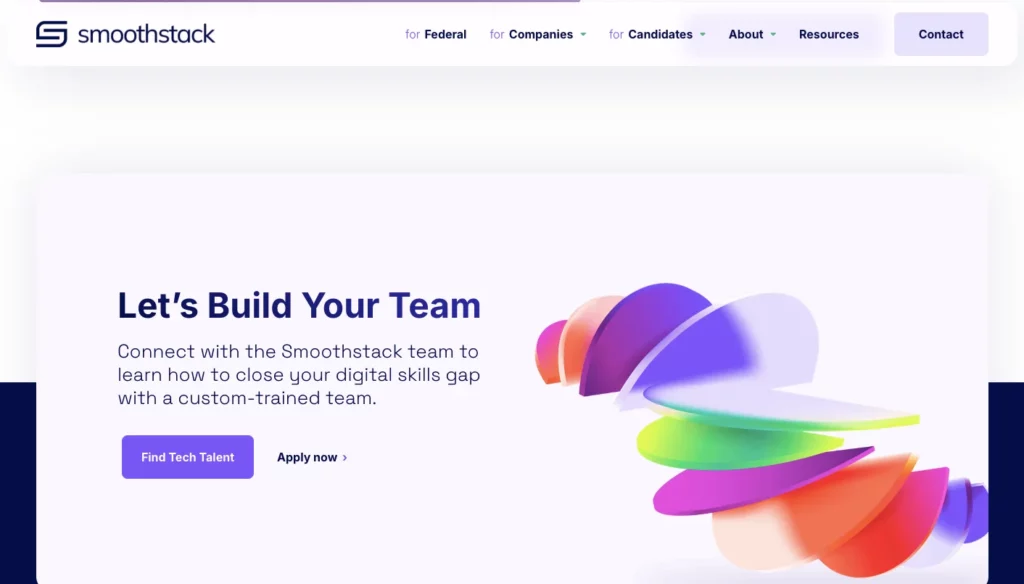
Smoothstack, Inc., is a technology staffing agency and training company headquartered in Fairfax, Virginia, USA. It markets its services as bridging the gap between companies and emerging tech talent. However, the Smoothstack lawsuit alleges that the company coerced employees and prevented them from seeking better working conditions.
How Smoothstack’s Business Model Works
To bring quality tech talent to employers, Smoothstack provides training and employment opportunities for individuals looking to begin or advance their careers in information technology (IT) fields like cybersecurity and software development. Smoothstack recruits individuals, many of whom are fresh graduates, and puts them through intensive training programs in high-demand tech fields such as cloud computing.
This allows companies to quickly and affordably access skilled IT professionals and provides IT professionals with the chance to enhance the skills gap and gain experience in new technologies.
Upon completing the training, employees are assigned to work for Smoothstack’s clients, which range from mid-sized companies to larger corporations. In return for their training and job placement, employees must sign contracts requiring them to remain in Smoothstack’s talent pool for a set commitment period, typically two years.
These are known as Training Repayment Agreement Provisions (TRAPs). If employees leave the company before the contract ends, they face stiff financial penalties, which plaintiffs claim can range from several thousand dollars to the full cost of the training and support they’ve received, reported to be up to $24,000.
The Allegations Against Smoothstack
The primary Smoothstack lawsuit filed by plaintiff Justin O’Brien in the US District Court for the Eastern District of New York is based on allegations that the company misled its workers about the nature of their employment contracts. Here is a breakdown of the primary allegations:
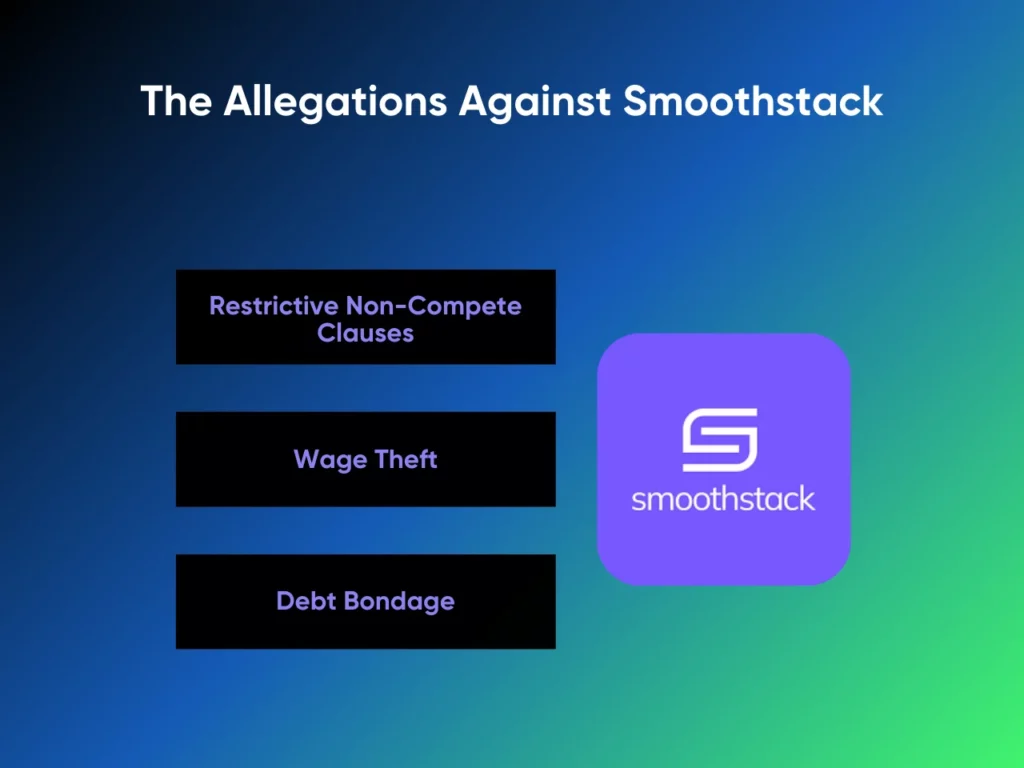
- Restrictive Non-Compete Clauses: Plaintiffs claim that Smoothstack Inc. made their employees sign restrictive agreements, preventing them from seeking other job opportunities, with severe financial penalties for doing so.
- Wage Theft: Smoothstack is also accused of underpaying their employees during training. For the first three weeks, employees received no pay, and during the remaining six months, they earned as little as $7.25 per hour for a 40-hour work week, despite often working 80 hours.
- Debt Bondage: Smoothstack workers have also raised concerns about the company’s training programs, alleging that they served more to trap them in debt instead of offering actual career advancement.
Critics have noted that Smoothstack’s predatory training repayment agreement provisions resemble historical examples of indentured servitude under harsh terms. The tech community has condemned these alleged actions as part of a broader pattern of labor exploitation in the tech industry. There are also complaints of false promises of rigorous training, claiming that Smoothstack’s training programs were actually below industry standards.
The Impact on Tech Workers and the Industry
Due to Smoothstack’s position as a technology staffing company, most individuals in the tech sector have strongly criticized its alleged activities. Tech workers often rely on training programs for better opportunities, and exploiting these systems for low-wage labor jeopardizes both the workers’ welfare and the industry’s future.
Media and Public Response
Various labor and worker organizations, such as Towards Justice and the Student Borrower Protection Center, have expressed support for the plaintiffs. The US Department of Labor has filed its own lawsuit against Smoothstack, intensifying media coverage of the Smoothstack lawsuit. The public is likewise following this landmark case, with some even noting that Smoothstack’s activities are only part of a larger scam involving student debt.
Legal Basis of the Lawsuit
The allegations in the Smoothstack lawsuit carry severe legal implications due to the gravity of the alleged violations. Let’s explore the legal background of the most severe accusations against Smoothstack.
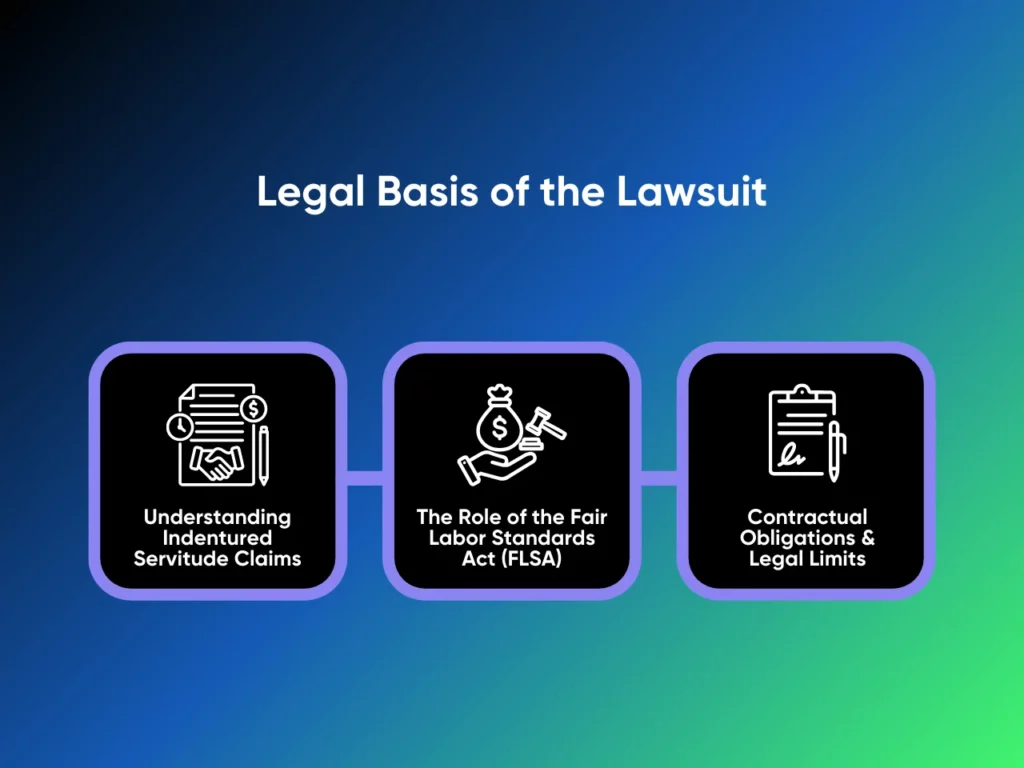
Understanding Indentured Servitude Claims
One of the central claims in the Smoothstack lawsuit is that the company’s employment contracts were misleadingly composed and trapped employees in what amounts to modern-day indentured servitude.
Indentured or involuntary servitude is defined as a condition in which a person is forced to work against their will through physical coercion or legal threats, including financial penalties like the ones that Smoothstack employees were threatened with.
Historically, indentured servitude involved trapping individuals in debt that they must work off over a fixed period, often under harsh conditions. Former Smoothstack employees claim that their contractual terms effectively induce those same conditions, along with the threat of facing severe financial consequences should they decide to leave the company.
Legally, indentured servitude is criminalized, along with slavery, under the Thirteenth Amendment to the U.S. Constitution, which reads: “Neither slavery nor involuntary servitude, except as a punishment for crime whereof the party shall have been duly convicted, shall exist within the United States, or any place subject to their jurisdiction.”
The Role of the Fair Labor Standards Act (FLSA)
The Fair Labor Standards Act (FLSA) sets minimum wage, overtime pay, and other labor standards for U.S. employers. If the allegations against Smoothstack, Inc. are proven true, then it would violate these standards, particularly Section 6 and Section 7, which state that employees must be paid at least the federal minimum wage for all hours of work and at least 1.5 times that rate for overtime hours. Although Smoothstack paid them the minimum wage, some employees worked up to twice their paid hours without receiving overtime compensation.
If the court finds Smoothstack in violation of the FLSA, the company could face harsh financial penalties, including compensating workers for lost wages and pain and suffering. Liquidated damages often amount to double the back wages employees are owed, not including legal fees and costs associated with bringing the lawsuit.
Contractual Obligations and Legal Limits
There is also the matter of whether the contracts Smoothstack had their employees sign violated the legal limits for restrictive covenants such as non-compete agreements. According to the plaintiffs, these were overly restrictive and unfairly prevented workers from pursuing better opportunities elsewhere.
Under common law, contracts restricting an employee’s ability to work for a competitor or leave for a better job must be narrow in scope, duration, and geography without imposing undue hardship. Smoothstack’s contracts, which forced employees to work for minimum wage with unpaid overtime, clearly create undue hardship for their employees.
Comparing the Smoothstack Case with Similar Lawsuits
Although the Smoothstack case is one of the most egregious examples of exploitative labor practices in tech, it is only the most recent in a rising trend of complaints against similar companies. Let’s take a look at some cases similar to the Smoothstack lawsuit.
Previous Cases of Tech Industry Exploitations
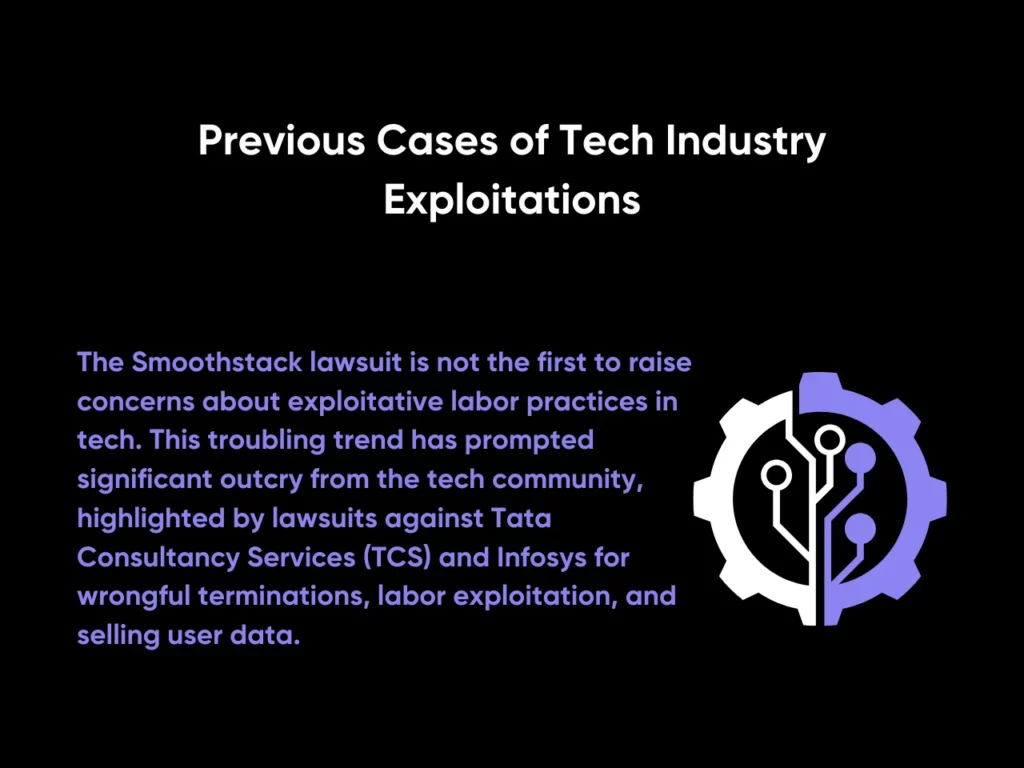
The Smoothstack lawsuit is not the first to raise concerns about exploitative labor practices in the tech industry. One reason for the significant outcry from the tech community is the troubling trend of this behavior.
The numerous lawsuits against Tata Consultancy Services (TCS) and Infosys are key examples. These multinational IT services and consulting companies based in India have faced accusations of wrongful terminations, labor exploitation, and even selling user data, both in their home country and abroad.
In the United States, Cognizant Technology Solutions has also faced several litigations due to similar allegations. Over the years, Cognizant has been accused of underpaying wages, wrongfully classifying workers to avoid paying overtime, and other restrictive and exploitative labor practices.
Outcomes and Settlements in Similar Litigations
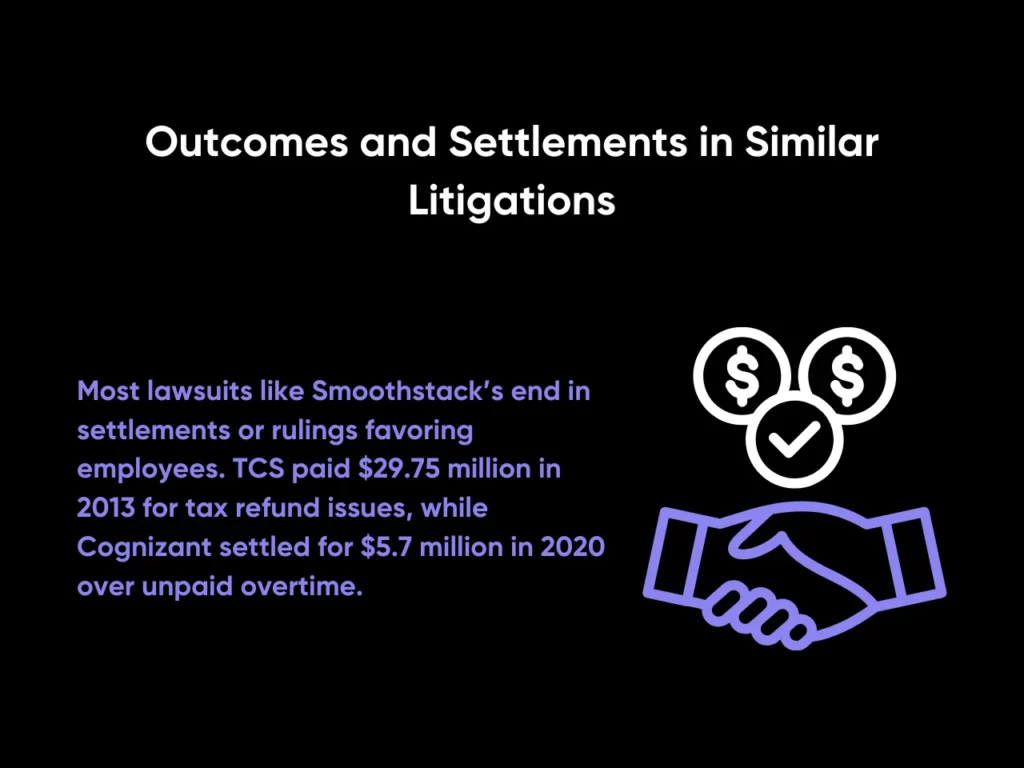
Fortunately, the majority of litigations, like the Smoothstack lawsuit, have resulted in settlements or court rulings in favor of the plaintiffs. Tata Consultancy Services, for example, has been paying class action settlements since 2013 for various offenses against its employees.
In 2013, a US court ordered TCS to pay its employees $29.75 million after they were forced to sign over all of their US federal and state tax refund checks to the company. This class action was brought by two non-US citizens, highlighting the tendency of the US courts to favor employees in such scenarios.
US-based companies like Cognizant often face similar repercussions. In 2020, Cognizant agreed to a $5.7 million settlement following a class action filed by a group of former employees who did not receive adequate overtime pay.
Implications for Future Cases
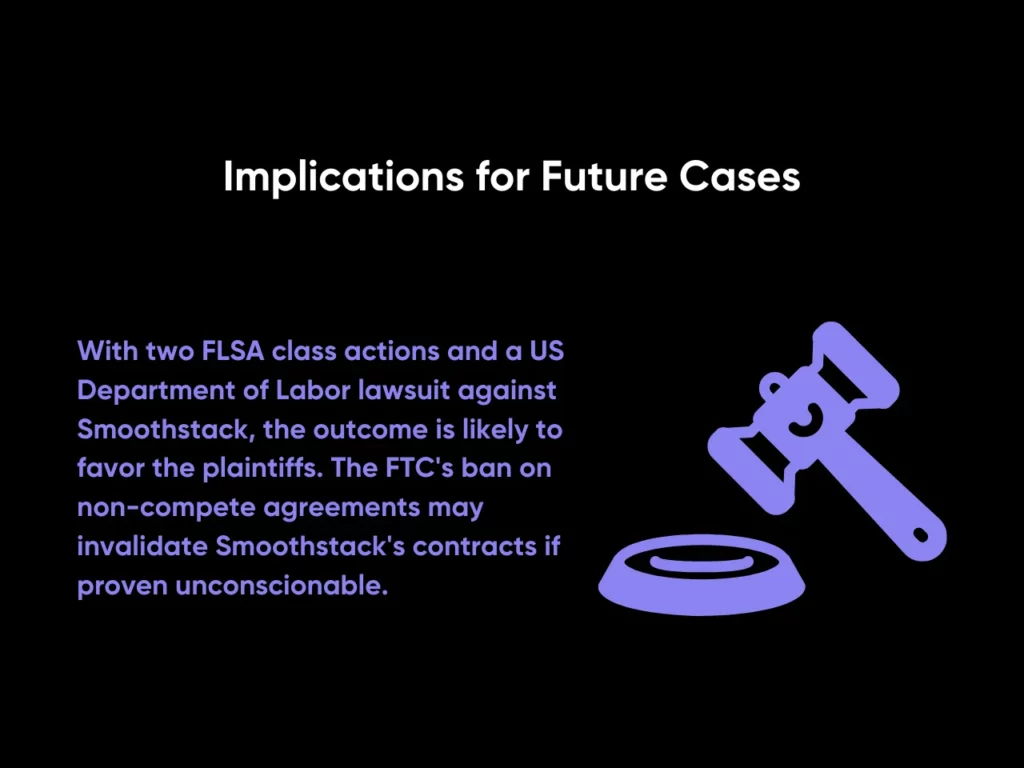
With two FLSA class actions and a lawsuit from the US Department of Labor filed against Smoothstack thus far, the outcome of the Smoothstack lawsuit will likely favor the plaintiffs.
The Federal Trade Commission (FTC) has officially banned non-compete agreements nationwide, which will render the contract that Smoothstack made their employees sign invalid once it can be proven in court that the conditions in it are unconscionable or unreasonable.
These combined efforts can encourage more workers to challenge similarly restrictive agreements and discourage other companies from drafting such agreements. The sweeping ban on non-compete agreements could also open the door to broader reforms in how tech companies can manage their employment contracts, particularly repayment agreements for training programs.
Key Takeaway
The Smoothstack lawsuit could establish a significant precedent for future class-action cases involving similar labor practices. If successful, this could encourage more workers to challenge restrictive agreements and prompt broader reforms in how tech companies manage employment contracts and training repayment agreements.
The involvement of federal agencies like the Department of Labor and the Federal Trade Commission and impact litigation strategies from nonprofit legal organizations like Toward Justice will make it much more effective to combat industry abuses in the tech sector. Tech worker power will thus be much easier to attain, paving the way for increased economic justice and more protections against exploitative labor practices in the future.
Would you like to receive updates on class action settlements for which you might be eligible to claim a payout? Get started with Sparrow today to get key information on class actions straight to your inbox. Our expert services can help you navigate all of the risks of joining a class action and get compensated as soon as possible.


